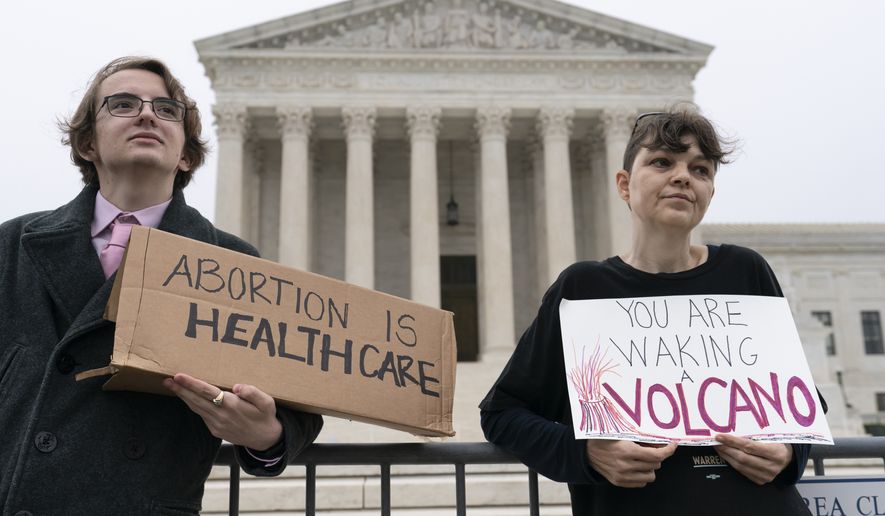OPINION:
Monday night, Politico published a copy of the Dobbs v. Jackson Women’s Health Organization draft opinion, which its reporters obtained from a confidential source “familiar with the Court’s proceedings.”
Sen. Dick Durbin called the leak “unprecedented,” while Sen. James Lankford called the leak “epic and earth-shattering.” Senate Minority Leader Mitch McConnell went further, saying the leak was designed to “stir up an appropriate pressure campaign … rip the blindfold off Lady Justice and override impartiality with intimidation” and “elevate mob rule over the rule of law.”
In a quick attempt to restore calm and confidence, Chief Justice John Roberts released a statement Tuesday morning, calling the leak a “betrayal that was intended to undermine the integrity of our operations,” while adding “it will not succeed … the work of the Court will not be affected in any way.”
Some have speculated the opinion was leaked specifically to do just that, perhaps to specifically nudge Justice Roberts from voting with his fellow conservatives. Even if the court’s work on this particular case goes unaffected, there could be other more severe long-term consequences.
In a telephone interview with the Washington Times, Harvard law professor Alan Dershowitz said he believes the real danger is what could happen now in the House and Senate chambers of the U.S. Capitol, rather than on the streets of Washington.
“I think the decision to leak was an act of civil disobedience, probably by a law clerk who was strongly opposed to overturning Roe,” he told the Times.
“I think it’s an attempt to intimidate the court, but I think it will fail,” he said. “I don’t think it’s going to influence the justices’ decision, but I think it will do damage to the Supreme Court.”
When pressed for details, Mr. Dershowitz said, “what’s more likely is that Congress could seriously threaten court-packing.
Mr. Dershowitz is not alone in his concerns. In a speech given on the Senate floor Tuesday morning, Mr. Lankford suggested, “whoever leaked this out is trying to bring politics to the court,” [and] “destroy trust within the body,” and Mr. McConnell added that surely, “the cheerleaders for court-packing applauded” the act of leaking the opinion, knowing full well it would cause a “political firestorm.”
Indeed, after the leak, Sen. Ed Markey proclaimed: “A stolen, illegitimate, and far-right Supreme Court majority appears set to destroy the right to abortion, an essential right which protects the health, safety, and freedom of millions of Americans. There is no other recourse. We must expand the court.”
Other liberals, like Sens. Bernie Sanders and Kirsten Gillibrand, called to abolish the Senate filibuster, so Democrats could codify Roe v. Wade into legislation with a mere 50 votes.
“Congress must pass legislation that codifies Roe v. Wade as the law of the land in this country NOW,” Mr. Sanders demanded. “And if there aren’t 60 votes in the Senate to do it, and there are not, we must end the filibuster to pass it with 50 votes.”
Pro-choice organizations are mobilizing nationwide and protesters have already appeared on the steps of the Supreme Court. But this is to be expected. More concerning is the fact that President Biden and Senate Majority Leader Chuck Schumer have responded to the leak by vowing to seek passage of a federal law that would codify Roe under statute.
This preemptive response sends a dangerous signal that may encourage more subterfuge at the court in the future, achieving precisely what Mr. Lankford warned about — bringing politics to the court. This is a response the United States cannot afford, nor should it tolerate.
The court is the most apolitical institution in our nation and we depend on it to shield the Constitution. It cannot become a target of intimidation.
To that end, Mr. Dershowitz added there could be additional constitutional consequences if the court decides to strike back with measures to protect itself in the future from similar breaches. “This may also result in a crisis over [the news] reporter’s privilege,” he said referring to those protections afforded journalists to shield the identity of their confidential sources in legal proceedings. “I don’t think the court is going to be very sympathetic to a court leaker.”




Please read our comment policy before commenting.